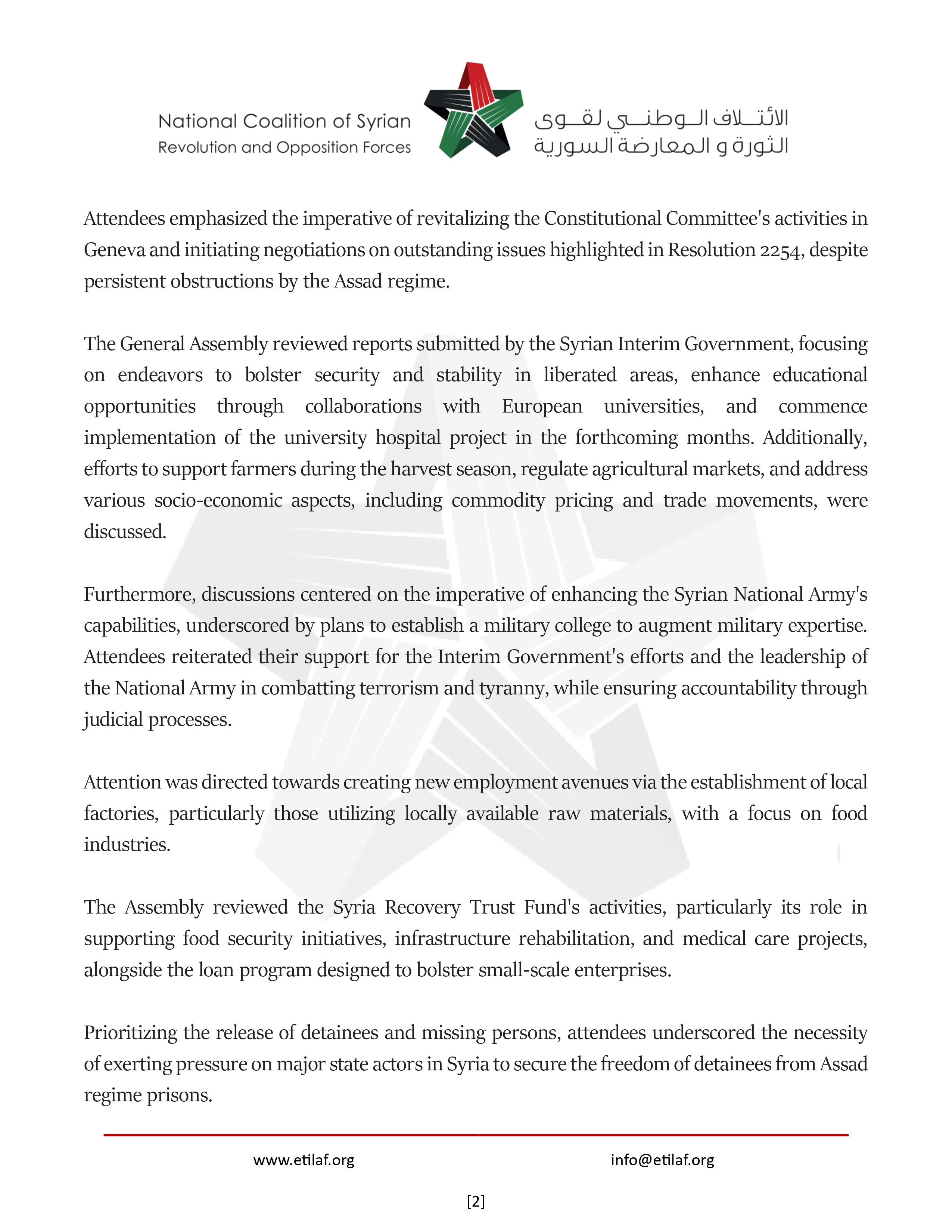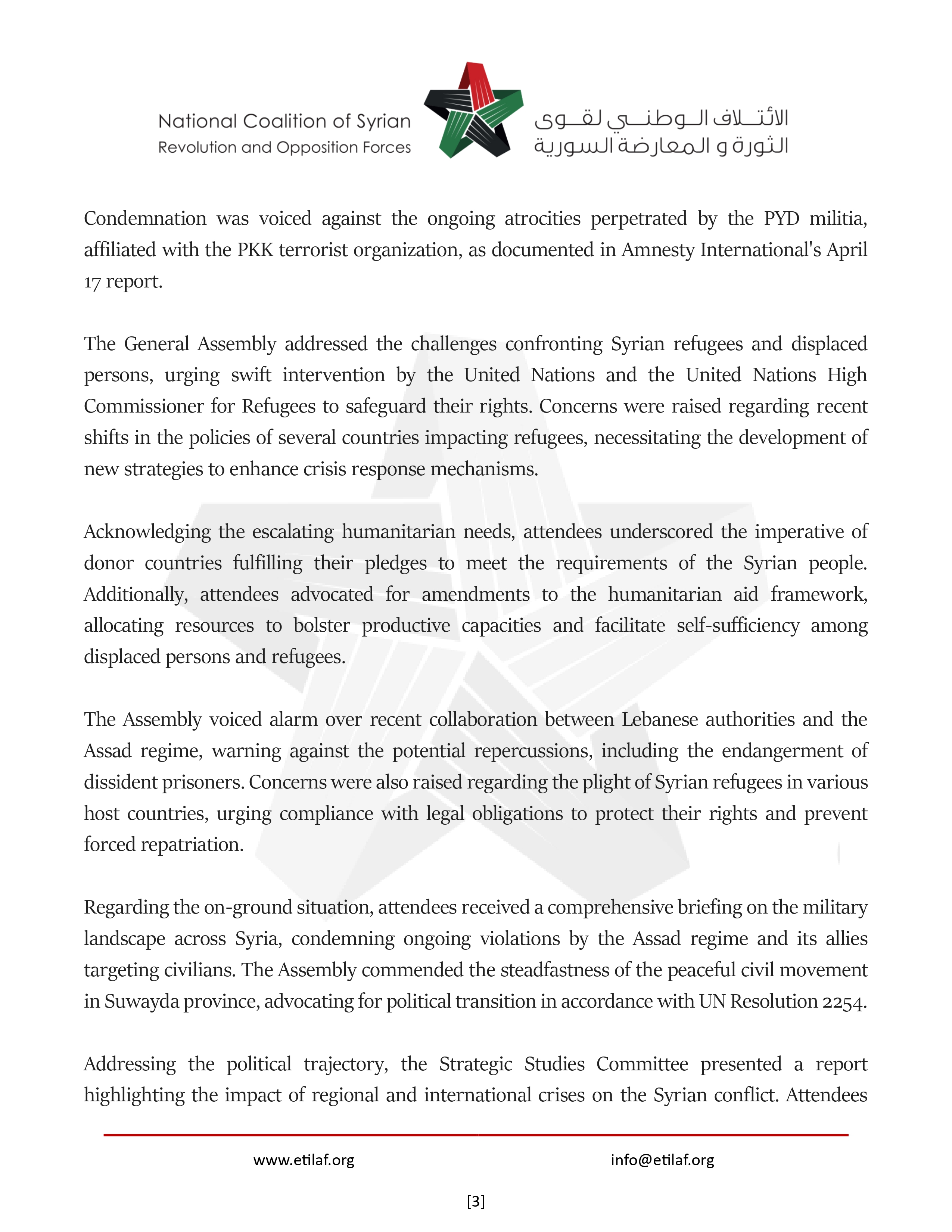Final communique
Syrian Opposition Coalition
General Assembly
May 1, 2024
The General Assembly of the Syrian Opposition Coalition (SOC) convened its 71st regular meeting on April 28 in the countryside of Aleppo. The Assembly commenced by honoring the esteemed late Syrian astronaut Muhammad Faris, acknowledging his accomplishments and unwavering national stances. The gathering commenced with a moment of silence in remembrance of the late Faris and the fallen heroes of the Syrian Revolution. President Hadi Al-Bahra delivered a political briefing, followed by comprehensive reports on the SOC’s recent activities over the past two months, encompassing updates from the presidency, representatives, general secretariat, working groups, offices, and representations.
The General Assembly deliberated on the latest advancements in the Syrian political landscape, as well as recent engagements between the SOC and UN and foreign officials. Emphasis was placed on the significance of the United States’ enactment of the Captagon 2 Act and the outcomes outlined in the statement of the G7 foreign ministers. Notably, the renewed commitment to the political process in alignment with UN resolutions, alongside endeavors to ensure justice and sustained humanitarian aid for the Syrian people, were underscored.
A comprehensive briefing was presented by the Syrian Negotiations Commission on recent political developments, outcomes from meetings with UN and foreign officials, and ongoing efforts toward a political resolution in accordance with UN Security Council Resolutions: 2254 (2015) and 2118 (2013). The Commission also outlined forthcoming activities scheduled at the Brussels conference.
Attendees emphasized the imperative of revitalizing the Constitutional Committee’s activities in Geneva and initiating negotiations on outstanding issues highlighted in Resolution 2254, despite persistent obstructions by the Assad regime.
The General Assembly reviewed reports submitted by the Syrian Interim Government, focusing on endeavors to bolster security and stability in liberated areas, enhance educational opportunities through collaborations with European universities, and commence implementation of the university hospital project in the forthcoming months. Additionally, efforts to support farmers during the harvest season, regulate agricultural markets, and address various socio-economic aspects, including commodity pricing and trade movements, were discussed.
Furthermore, discussions centered on the imperative of enhancing the Syrian National Army’s capabilities, underscored by plans to establish a military college to augment military expertise. Attendees reiterated their support for the Interim Government’s efforts and the leadership of the National Army in combatting terrorism and tyranny, while ensuring accountability through judicial processes.
Attention was directed towards creating new employment avenues via the establishment of local factories, particularly those utilizing locally available raw materials, with a focus on food industries.
The Assembly reviewed the Syria Recovery Trust Fund’s activities, particularly its role in supporting food security initiatives, infrastructure rehabilitation, and medical care projects, alongside the loan program designed to bolster small-scale enterprises.
Prioritizing the release of detainees and missing persons, attendees underscored the necessity of exerting pressure on major state actors in Syria to secure the freedom of detainees from Assad regime prisons.
Condemnation was voiced against the ongoing atrocities perpetrated by the PYD militia, affiliated with the PKK terrorist organization, as documented in Amnesty International’s April 17 report.
The General Assembly addressed the challenges confronting Syrian refugees and displaced persons, urging swift intervention by the United Nations and the United Nations High Commissioner for Refugees to safeguard their rights. Concerns were raised regarding recent shifts in the policies of several countries impacting refugees, necessitating the development of new strategies to enhance crisis response mechanisms.
Acknowledging the escalating humanitarian needs, attendees underscored the imperative of donor countries fulfilling their pledges to meet the requirements of the Syrian people. Additionally, attendees advocated for amendments to the humanitarian aid framework, allocating resources to bolster productive capacities and facilitate self-sufficiency among displaced persons and refugees.
The Assembly voiced alarm over recent collaboration between Lebanese authorities and the Assad regime, warning against the potential repercussions, including the endangerment of dissident prisoners. Concerns were also raised regarding the plight of Syrian refugees in various host countries, urging compliance with legal obligations to protect their rights and prevent forced repatriation.
Regarding the on-ground situation, attendees received a comprehensive briefing on the military landscape across Syria, condemning ongoing violations by the Assad regime and its allies targeting civilians. The Assembly commended the steadfastness of the peaceful civil movement in Suwayda province, advocating for political transition in accordance with UN Resolution 2254.
Addressing the political trajectory, the Strategic Studies Committee presented a report highlighting the impact of regional and international crises on the Syrian conflict. Attendees stressed the urgency of elevating the Syrian crisis on the global agenda and implementing effective policies to facilitate a comprehensive solution aligned with Security Council resolutions.
The SOC reaffirmed its commitment to advancing reforms aimed at establishing an impartial and independent judiciary, strengthening law enforcement agencies, and upholding human rights principles. Emphasis was placed on achieving security, safety, and justice for all citizens in liberated areas as fundamental aspirations of the Syrian people.
The General Assembly called upon the international community to actively support accountability mechanisms for perpetrators of war crimes and crimes against humanity, while fulfilling legal obligations outlined in Security Council Resolutions 2254 and 2118. The SOC reiterated its dedication to realizing the Syrian people’s aspirations for freedom, democracy, and equal citizenship grounded in principles of justice and respect for human rights.
Attendees commended the resilience of the Syrian people in upholding their principles amidst significant challenges, expressing pride in their achievements within liberated areas and host countries. The SOC renewed its commitment to advancing the aspirations of the Syrian populace, serving as a guiding principle for its endeavors and vision.
May the fallen heroes rest in peace, and the detainees be free.
May the displaced and refugees return to their homes safely.
Let glory shine upon the steadfast Syrian people.
Long live Syria, free and honored.












